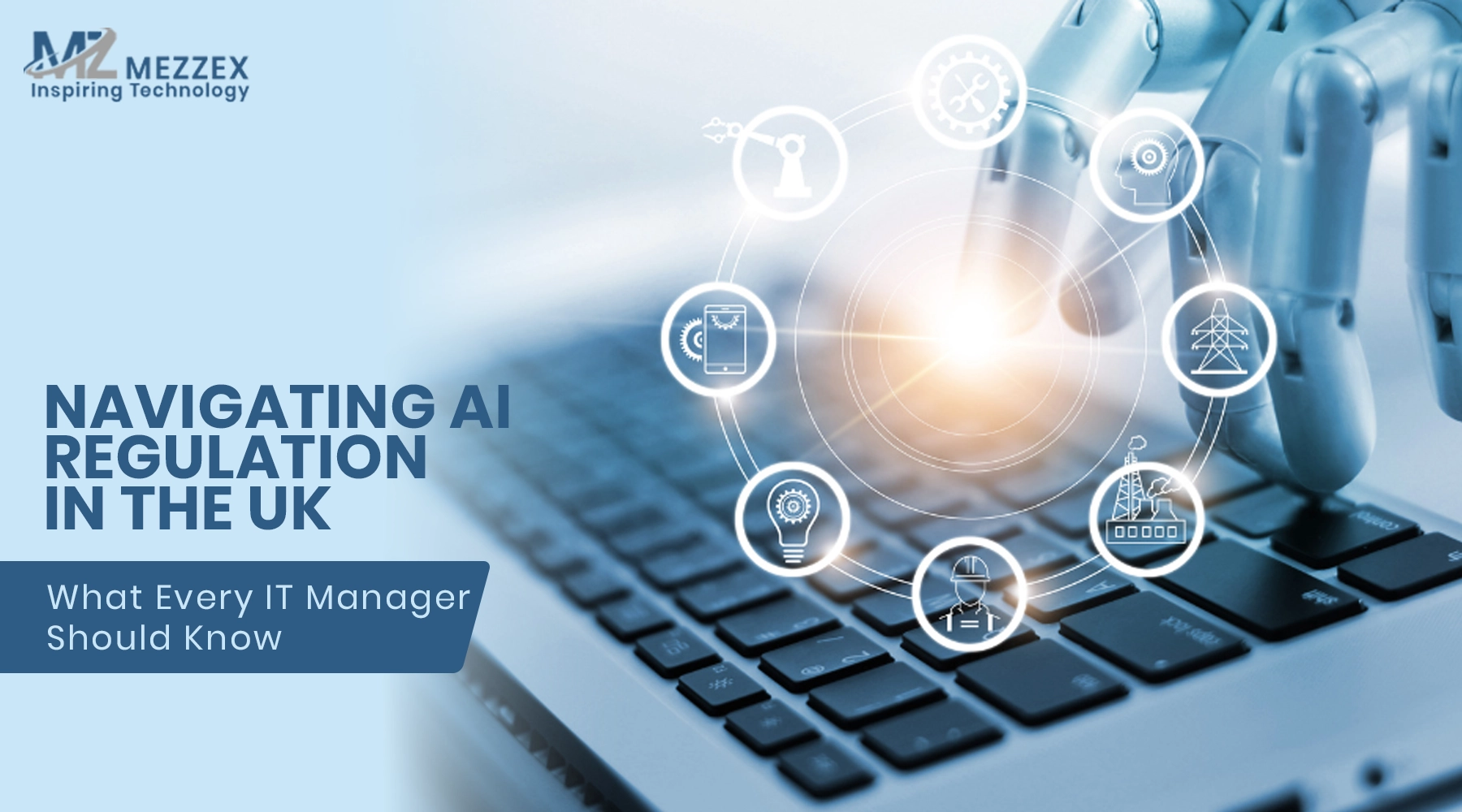
IT-Services
Navigating AI Regulation in the UK: What Every IT Manager Should Know
Artificial intelligence is no longer experimental, it is now embedded in banking, healthcare, retail, and logistics across the UK. IT managers are already integrating tools for fraud detection, customer support, and predictive analytics. Yet as AI becomes essential, it also attracts growing scrutiny.
The UK government is shaping new regulatory frameworks that balance innovation with accountability. By the end of 2025, compliance expectations will become clearer and stricter, especially for organisations handling sensitive data or operating in regulated sectors.
For IT managers, this shift represents a turning point. Beyond managing infrastructure, they must now ensure AI tools meet legal standards, ethical requirements, and governance frameworks. Failure to adapt risks not only compliance breaches but also reputational damage and lost trust.
This blog explains the current regulatory landscape, highlights what’s changing, and sets out the governance responsibilities IT managers need to prioritise.
The Current State of AI Regulation in the UK
AI regulation in the UK is evolving under a principles-based approach. Instead of one overarching law, regulators are issuing targeted guidance. IT managers must note:
Government principles: Safety, fairness, transparency, accountability, and contestability form the foundation of regulatory expectations.
Key regulators:
ICO (Information Commissioner’s Office) monitors AI use for data protection.
CMA (Competition and Markets Authority) ensures algorithms do not distort fair competition.
Practical compliance: While no AI Act exists yet, firms must prove they are applying principles in real-world systems, from data handling to decision-making.
Industry impact: Financial services, healthcare, and public sector bodies are under particular scrutiny, with regulators already testing compliance practices.
AI Compliance: What IT Managers Must Prepare For
Compliance demands are becoming more defined and enforceable. IT managers should expect:
Sector-specific frameworks: Finance and healthcare will face strict transparency and accountability requirements, with mandatory reporting expected.
Documentation standards: Detailed records of training data, testing outcomes, and deployment procedures will be essential during audits.
Explainability requirements: Regulators may require firms to explain how algorithms produce outcomes, ensuring decisions are not “black boxes.”
Mandatory audits: Ethical AI audits are likely to move from best practice to obligation in sensitive industries.
Cross-border alignment: The UK is expected to align parts of its approach with the EU’s AI Act, meaning IT managers in multinational organisations must prepare for both frameworks.
Why IT Governance Is Critical in AI Regulation
AI introduces new risks that cannot be managed without robust governance. For IT managers, governance means more than compliance, it is about ensuring responsible adoption.
Strategic alignment: Governance ensures AI projects support business objectives while meeting external obligations.
Risk oversight: Without governance, “shadow AI”, unapproved tools introduced by departments, can create major compliance risks.
Accountability structures: Governance assigns responsibility, ensuring there is clarity on who addresses AI-related risks and incidents.
Ethical culture: Good governance prevents rushed adoption and promotes ethical use of AI across the organisation.
Key Responsibilities for IT Managers
IT managers sit at the centre of AI compliance. Their responsibilities span across:
Data protection: Guarantee AI systems comply with GDPR and the UK Data Protection Act, covering consent, data retention, and privacy.
Model transparency: Keep records of datasets, training methods, and logic behind AI models to demonstrate compliance if audited.
Bias and fairness checks: Establish monitoring routines to identify and mitigate discriminatory outputs in AI decisions.
Risk management: Maintain risk registers with identified AI risks, mitigation steps, and ownership.
Third-party oversight: Vet external AI vendors to ensure tools meet UK compliance standards before deployment.
Incident escalation: Build clear processes for reporting, investigating, and resolving AI-related compliance concerns.
Building a Roadmap for AI Compliance
Preparation requires a structured, proactive plan. IT managers should build their roadmap around:
System audit: List all AI systems in use, assessing compliance risks and data handling.
Governance policies: Draft policies covering approval, procurement, deployment, and review of AI tools.
Staff training: Provide education to IT staff and business users on compliant and ethical AI use.
Comprehensive documentation: Keep detailed logs of AI projects, including updates, monitoring results, and compliance checks.
Cross-department collaboration: Align IT with legal, compliance, and HR teams to ensure shared responsibility.
Ongoing monitoring: Schedule regular reviews of AI systems as regulation evolves toward 2025.
Common Pitfalls IT Managers Must Avoid
Even prepared organisations risk compliance gaps. IT managers should avoid:
Assuming vendor compliance: Never rely solely on external suppliers’ claims, conduct independent checks.
Weak documentation: Incomplete records can leave firms unable to prove compliance, even if practices are ethical.
Neglecting bias testing: Failure to test for bias can lead to reputational damage and potential regulatory action.
Surface-level compliance: Treating compliance as a checklist instead of embedding governance into culture.
Reactive planning: Waiting for final legislation instead of proactively building governance structures.
Talk To Us Today
AI regulation in the UK is entering a defining stage. By the end of 2025, compliance will not be optional, it will be the measure that separates forward-thinking businesses from those left behind. For IT managers, the responsibility is clear: governance, accountability, and readiness. At Mezzex, we partner with IT leaders to strengthen governance, modernise systems, and prepare infrastructures for compliance. Our focus is on aligning innovation with regulation, giving organisations the tools to integrate AI responsibly and securely. Explore our IT services to see how we can help you prepare for AI compliance, and position your organisation as a leader in responsible AI adoption.
Powered by Froala Editor



